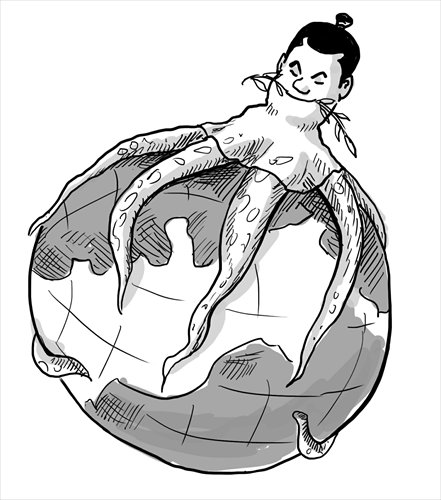Japan playing false in bid to be ‘normal’

Illustration: Liu Rui/GT
The concept of turning to a "normal country" first appeared in 1994 in Blueprint for a New Japan: The Rethinking of a Nation by Ichiro Ozawa, former leader of the Democratic Party of Japan. However, since then, Ozawa has rarely mentioned the concept, nor has it appeared in formal Japanese government documents.
There have been different views on whether Japan is a normal state and how it can return to normalcy. We need firstly to have an explicit understanding of what constitutes a so-called normal country.
Japanese leaders refuse to acknowledge and reflect on their wartime history. Instead, they visited the notorious Yasukuni Shrine that enshrines Class-A war criminals from WWII including Hideki Tojo. Therefore, Japan is not really a normal state compared with postwar Germany.
It is a false proposition for Japan to think of itself as abnormal simply because it must refrain from waging war and exercising the right to collective self-defense on foreign land under the framework of its postwar constitution. China has never engaged in overseas warfare, but does it make any sense to say China is an abnormal country? The answer is absolutely not.
Tokyo's claim that being denied military power leads to its abnormality is groundless, as its self-defense forces comprising maritime, air and land troops give it an incredible defensive power.
So why do so many claim that Japan is abnormal and that the attempts of Abe's cabinet are merely to turn it into a normal state? It is because they are sparing no efforts in diverting public attention from Japan's right-wing politics.
Japan sees China as an imaginary enemy while coping with the changing international landscape. It has been focusing on countering a rising China with various forces instead of conforming to the trend of the times, which is one of the most important reasons for its strategic missteps.
It is, therefore, crucial to urge Japanese policymakers to transform their mode and perspective of thinking. For instance, we should prompt the Japanese government to form a correct understanding of the nontraditional international architecture, the new type of great power relations between China and the US, as well as the contest between peaceful multilateralism and violent multilateralism. Only in this way will Japan likely recognize that enticing Washington into confronting Beijing via military means is unworkable and that calling on other states to practice "violent multilateralism" toward China is doomed to failure.
The national security strategy and "proactive pacifism" Tokyo should adopt are engaging in peaceful multilateralism, seeking to improve relations with Beijing, Washington and Moscow, and advancing trilateral relations between China, Japan and South Korea as well as cooperation under the "10+3" framework, so that Japan can become a peaceful force for development welcomed by other Asia-Pacific nations.
International terrorism and violent multilateralism comprise two major threats to international security in the new millennium. The latter deserves in every way to be called a modern version of the Eight-Nation Alliance, as it allows the invasion of a sovereign state by military blocs.
After the Cold War, none of the regional wars and acts of military aggression launched by the NATO-led forces into sovereign states wiped out terrorism, but instead caused calamitous loss of life and property and terrible financial or social crises.
China has been participating in peaceful multilateralism and proposing to solve international disputes through dialogues and consultations. The Syrian government agreed in 2013 to remove its lethal chemical weapons, marking the first time violent multilateralism was restrained since the end of the Cold War. Apart from China and Russia, the UK and Germany also displayed a rather wise attitude. Factionalism and a fiscal impasse prevented Washington from launching any military strikes.
But there was one tendency in East Asia that needs our vigilance. On the one hand, multilateral joint military drills directed at the Korean Peninsula are gathering momentum. On the other, Abe's government is straining every nerve to renounce the postwar pacifist constitution to justify its use of military forces overseas.
Abe, the rabid nationalist, has proposed "proactive pacifism" while trying to reconfigure an East Asian strategic architecture to rein in Beijing by counting on Washington, taking advantage of Manila, and even attempting to establish security cooperation with NATO. He is actually paving the way for violent multilateralism in East Asia with the US-Japan alliance as its core. However, he will only find himself in a blind alley, because a low-cost and highly secure peaceful multilateralism is the sustainable national security model for the future.
The author is vice director of the Institute of Modern International Relations, Tsinghua University. opinion@globaltimes.com.cn